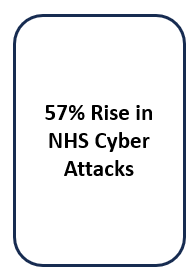
As the healthcare sector strives to recover from the pandemic, it faces a mounting global challenge: cyber security. Cyber criminals are ruthlessly targeting healthcare systems, exploiting vulnerabilities and compromising sensitive data. Recent attacks in the US and the UK have exposed critical flaws in the cybersecurity infrastructure, emphasising the urgent need for action. Safeguarding patient data and ensuring uninterrupted healthcare services hinge upon effectively addressing and countering these risks.
The healthcare industry heavily relies on interconnected systems and suppliers to support its operations. However, this interconnectedness of the supply chain has become a potential entry point for cyber attackers. Two weeks ago there was a cyber attack on the National Health Service (NHS) ambulance service by hackers who exploited a vulnerability in their IT supplier’s systems. Even though only two trusts were affected, the attack caused significant disruptions in multiple hospitals and facilities, resulting in limited access to millions of patients’ electronic records. This incident further strains the already overwhelmed NHS, which had to resort to using analogue systems for those effected.
Cybersecurity threats in the healthcare sector target vulnerabilities to gain unauthorised access to sensitive patient data. These attacks may not be immediately apparent and can take a significant amount of time to detect. Last week, a cyber attack on the US healthcare system targeted multiple health providers, resulting in the exposure of confidential patient information. It was reported that the attackers had access to electronic medical records, appointment scheduling systems, billing systems, and more. The system was rendered unusable, surgeries and other operations were cancelled leading to delays in care for thousands of patients. To mitigate these risks, it is crucial to limit data access to authorised parties and enforce stringent security protocols.
 Supply chain attacks have become increasingly prevalent in the healthcare industry. Hackers target external vendors or suppliers who have access to healthcare systems, bypassing traditional security measures implemented by hospitals or healthcare organisations. Successful attacks compromise sensitive information, including medical records and intellectual property, posing significant risks to patient privacy and industry interests.
Supply chain attacks have become increasingly prevalent in the healthcare industry. Hackers target external vendors or suppliers who have access to healthcare systems, bypassing traditional security measures implemented by hospitals or healthcare organisations. Successful attacks compromise sensitive information, including medical records and intellectual property, posing significant risks to patient privacy and industry interests.
Attacks on the health care isn’t a new phenomenon but it is increasing, in May 2023 there were 1383 cyber attacks in health care per week up from 797 in May 2022. The NHS attack mentioned above is the 3rd big cyber attack since a Ransomware attack on an NHS supplier in August of last year caused widespread outages across the NHS. It is believed the attackers were targeting patient data, Ransomware encrypts data and demands payment to unlock it, exploiting the healthcare industry’s reliance on technology and medical devices. Attackers leverage the vital role of healthcare providers in people’s lives to demand substantial ransom. The attack affected services for several weeks afterwards with healthcare staff in certain regions reverting to taking care notes with pen and paper.
To combat such attacks, the healthcare industry must adopt comprehensive cybersecurity measures, including assessing risks within the supply chain and implementing stringent access controls. Having robust backup and disaster recovery plans in place is crucial to swiftly recover from cyber incidents. Continuous monitoring and threat recognition software systems help detect and respond to potential intrusions
Safeguarding the healthcare system from cyber threats is of utmost importance. Recent attacks serve as a wake-up call for all stakeholders, including CISOs and supply chain managers. It is imperative to adopt proactive and comprehensive cybersecurity measures, leaving behind outdated security approaches. Let us work together to protect our healthcare system and ensure the safety and well-being of our patients.

